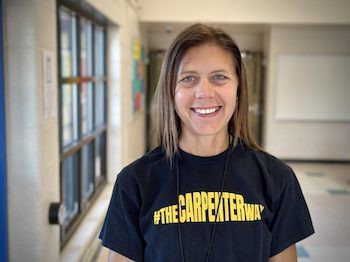By Jo Matthis / AAPS
Carpenter Elementary Title 1 Teacher Robin Birdsong grew up in southern Oregon and attended the University of Oregon. After graduating from college, Birdsong and her husband served as Peace Corps volunteers in Kazakhstan. Teaching English in Kazakhstan was her first teaching experience and it led her to consider pursuing a career in education when they returned.
She first worked as an English Learner and Special Education assistant in her brothers’ elementary school in Portland, Oregon. Birdsong loved working with such a diverse community of learners and the work inspired her to get her Masters in Teaching at Lewis and Clark College. She then began teaching in a Spanish-English bilingual education program in the Portland area. In the 14 years that Birdsong taught in Oregon, she worked as a Spanish literacy teacher, first grade teacher, and literacy coach in two different bilingual/dual immersion programs.
Birdsong moved to Ann Arbor in 2018 with her husband, Will, and her two daughters, Adella and Alma. She began working as the Title I teacher at Carpenter that same year and has been there ever since. Outside of work, Birdsong loves being outside, hiking, cooking, and playing tennis. She says she and her family love living in Ann Arbor and feel so fortunate to be part of the Ann Arbor Public Schools family.
Carpenter Elementary Principal Michael Johnson says that Robin Birdsong is a loving, caring teacher who can spark enthusiasm in students with unique challenges, motivating them to strive for their best.
A: Can you explain what the Title 1 program is and the role it plays at Carpenter Elementary?
Title I is a federal grant program that provides additional funding for academic support programs to schools with higher needs. At Carpenter, our Title I program includes academic support in the form of additional small-group instruction in reading and math, high-quality supplemental materials for teachers and students, take-home books, family events, and training opportunities for teachers. Our
instructional support staff (Title I Teacher, Building Literacy and Math Coaches, and EL Teacher) collaborate with classroom teachers to implement these programs.
Q: What do you like about working at AAPS, and at Carpenter in particular?
A: I love my role at Carpenter and feel truly fortunate to be part of such an energetic and supportive school community! I really appreciate how our teaching teams collaborate. We have experienced, supportive administrators, energetic and skilled classroom teachers and support teachers at Carpenter. Our Building Support Team (BST) has worked together for several years and we have been able to help develop systems which work well to support our students in their learning. For example, we have developed a master schedule that allows for grade-level common planning times and common reading and math blocks, we facilitate regular data teams and consistent collaboration for differentiated interventions and academic support.
I also love learning about each student who I work with, helping to identify their strengths and areas for growth, and designing instruction that meets their needs. I get to work in almost every classroom, get to know many of the students, and be a part of their growth and development throughout their time at Carpenter. It is such a joy to be a part of their educational journey.
Additionally, in this position, I am fortunate to have opportunities to learn about new research and teaching methods and learn from other teachers, and apply this learning to my teaching and in my collaboration with teachers and tutors. I have recently completed the LETRS certification and AVMR 1 certification training programs and these trainings have definitely helped me develop as a teacher.
Carpenter students, families, and teachers bring a wide variety of perspectives, backgrounds, and identities to our school. Carpenter is a wonderfully diverse and energetic community and I love getting to know the students and families, learn from them and collaborate with them. All of our students deserve our best. One challenge to this position, and in any teaching position, is finding the time and resources to give our students all that they deserve every day– there often seems to be more that we want to give our students than we have time for.
Q: What are some of the unique challenges and rewards of your current role?
A: Carpenter students and families bring a wide variety of perspectives, backgrounds, and identities to our school. Carpenter is a wonderfully diverse and energetic community and I love getting to know them, learn from them, and collaborate with them. All of our students deserve our best. One challenge to this position, and any position in teaching, is finding the time and resources to give our students all that they deserve every day. There often seems to be more that we want to give our students than we have time for.
Q: How do you approach differentiating instruction to meet the diverse needs of your
students?
A: At Carpenter, we strive to use an asset-based approach to teaching– building on and connecting to student strengths to help them learn new skills. Through targeted assessments, we identify concrete skills for instruction, instruct on those skills, and then monitor progress frequently so that we can move on to the next skill that the student is ready for or reteach content in a more accessible way. We take part in regular grade-level data team meetings where we look at assessment data and set individual reading goals for every student to meet each student’s needs.
Q: How do you collaborate with colleagues and other support staff to ensure student success?
A: Collaboration is key and our support teachers (including myself) communicate frequently with classroom teachers in order to coordinate instruction and check in with families and students about their learning.
Q: What resources or support systems do you think are essential for Title 1 students
to thrive?
● Strong relationships – between teachers and students, among students,
among teachers and between teachers and families
● High expectations for both students and teachers
● Culturally relevant instruction that includes highly-trained, skilled teachers who have the ability to differentiate instruction and accelerate students’ learning through a progression of skills
● Student ownership in learning
● Partnership with families
● Collaboration in teaching
Q: How do you take care of yourself and avoid burnout?
I have found that making time to relax and rejuvenate is really important. Playing tennis and doing outdoor activities help me feel refreshed. Spending time with my husband and daughters and connecting with friends also helps give me energy and strength. Finding connections with co-workers and not being afraid to ask for help has also helped me be less overwhelmed. I also try to give myself grace and kindness and remind myself that work will always be there and as much as I value the work that I do, I also need to step aside to take care of myself.








